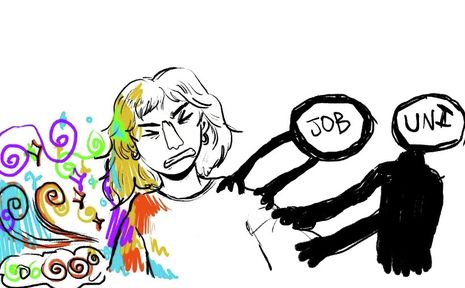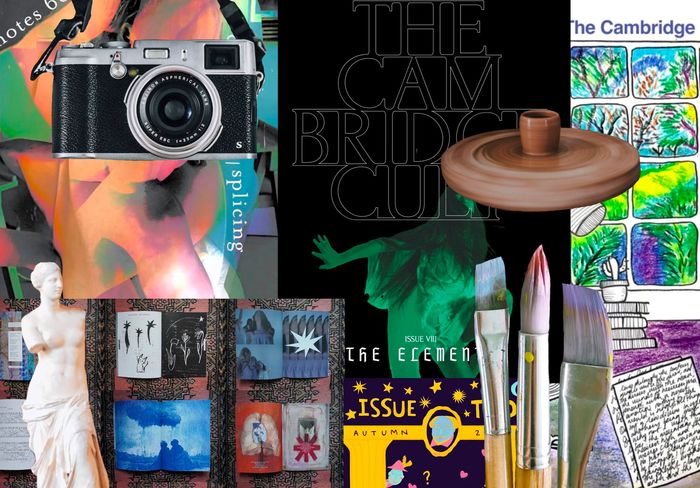The Cambridge creativity trap
Lara Cort considers the challenge of maintaining creative outlets during term time and the importance of allowing time for non-academic pursuits

It happens every term: you vow that you are going to commit to a bi-weekly life drawing society as you’re packing your belongings into your parents’ car to move back to Cambridge. But in a blink of an eye, its Week 5, you have three essays due, and your art pencils are collecting dust in the bottom of a forgotten bag in your wardrobe. Or maybe it’s a project for your friend’s birthday that you gave up as there was no chance it would be ready in time, or a play that’s frozen in time in the middle of Act 1. Either way, while the Cambridge term ignites a midst of creative inspiration for some people, for others it is eight weeks where any extra-curricular talents are put on pause and to be resurrected only when the looming threat of a degree is no longer in sight.
As a music student, my course seems to bridge the gap between the creative and academic realms and I have the freedom to decide how much of either I would like to do. Instead of creative outlets, I’ve found myself turning to sport, resurrecting the days of Year 9 netball, or new extracurriculars that I never thought I would be interested in or very good at.
However, I did not always have this mindset – when I arrived in first year, I struggled to grapple with the fact that music, which had once been my escape from academic pressure, had suddenly become the academic pressure itself and I no longer had any outlet to rely on. After a day of supos and library sessions, playing my instrument or composing a theory exercise felt like the last thing I wanted to do. I would often find myself making excuses as to why I could skip a practice session that night, simultaneously feeling the ‘I should be working guilt’ alongside a complete lack of excitement and overwhelming fatigue to produce anything remotely creative. Over time, I was able to strike up a balance, especially after specialising at the start of this term, but for the majority of people where there is little non-academic content within their degree – are they truly able to find a balance, or does the rigour of term time take over from any creative outlets?
Home to one of the largest theatre scenes in the UK, Cambridge provides a multitude of opportunities for students to get involved in the dramatic arts. It’s in this scene where Isaac, now a second-year medic, started stand-up comedy in his first year. He finds that his degree amplifies his creativity and is one of the reasons as to why he got involved in comedy.
“I don’t feel like my creativity is being sapped in Cambridge, if anything [it’s] enhanced because I don’t do stand up at home. Having the workload of Cambridge made me need to have an outlet like that.”
With most shows pre-planned at the start of term, Cambridge theatre can force you to carve out time in term to temporarily put the degree on hold and produce something meaningfully creative meaningful. Unlike other crafty hobbies, theatre activities are organised with clear schedules, allowing for clear delineations between degree work and writing, rehearsing or performing a show. Additionally, as a generally collaborative medium focused on delivering a performance, you are held accountable because other people depend on your presence and contribution, something that isn’t present in more independent mediums. This can alleviate the pressure of having to find these moments yourself and instead create situations where you can switch off from academia for an hour or two and commit to the project.
However, this structured style of creativity is not a ‘one size fits all’ medium, and may not be what some creative individuals are looking for. George, a second-year lawyer, had interests in sewing and graphic design throughout sixth form but since arriving last September, has struggled to keep them up:
“I feel like if you don’t fall into the very specific category of activities here, even though there’s a variety of them, it’s very hard to pursue your own things.”
A lot of the time this barrier is mental in nature; while many of us understand that we may be able to find the time to keep up with previous (or new) hobbies, an underlying sense of guilt can often hinder us from being able to truly enjoy it.
“It’s not just the time, but also the feeling that’s in the back of your head that you should be doing other things that are more valuable… the expectation that you should spend most of your time working.”
“The academic rigour of Cambridge starts to seep out from the academic world and into everyday life”
It’s here when the academic rigour of Cambridge starts to seep out from the academic world and into everyday life. The mental load of trying to please supervisors, comparing yourself to others and suffering from imposter syndrome, alongside moving away from home and budgeting can be too debilitating to find the capacity to do anything else. It risks eliciting a feeling of obligation that can ruin the joy of wanting to do something merely because of the pleasure of doing it. This means that in moments where you do find yourself with some free time, you feel depleted of energy, and it can feel too difficult to start something new.
“Allowing yourself time during term to work towards something other than your degree should not conjure up feelings of existential guilt and dread”
This does not necessarily mean that picking up knitting will fix your homesickness or complete your problem sheet for you. But, if you allow a moment or two a week to consider something other than your degree, you may surprise yourself in the talents that you find. Allowing yourself time during term to work towards something other than your degree should not conjure up feelings of existential guilt and dread, but instead provide necessary downtime which will be more beneficial for you in the long term.
When searching for balance in our schedules, we could all benefit from Isaac’s grandmother’s advice:
“I speak to Granny every week, and she tells me “work hard, play hard” and I stick to that.”
 News / Cambridge students set up encampment calling for Israel divestment6 May 2024
News / Cambridge students set up encampment calling for Israel divestment6 May 2024 News / Cambridge postgrad re-elected as City councillor4 May 2024
News / Cambridge postgrad re-elected as City councillor4 May 2024 News / Proposed changes to Cambridge exam resits remain stricter than most7 May 2024
News / Proposed changes to Cambridge exam resits remain stricter than most7 May 2024 News / Some supervisors’ effective pay rate £3 below living wage, new report finds5 May 2024
News / Some supervisors’ effective pay rate £3 below living wage, new report finds5 May 2024 Fashion / Class and closeted identities: how do fits fit into our cultures?6 May 2024
Fashion / Class and closeted identities: how do fits fit into our cultures?6 May 2024






